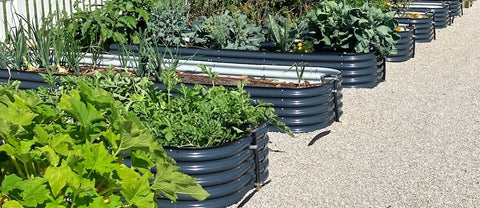Knowledge from Olle Garden Bed: Will Too Much Mulch Burn Plants
There is a common misconception about mulch and its potential to heat and damage plants. This article hopes to introduce the reason why the covering gets hot, and what you can do as a gardener to prevent it from happening, which all starts with the reason why it happens first. The following content also has some reference value for raised garden beds.

If the mulch is dry and stable, excessive mulch will not burn plants.
Use covers appropriately.
Covers come in many different shapes and sizes, but in some cases, some types of covers are superior to others. This seems like common sense, right?
If the cover works well in one environment and the other does not, you want to know it. How do you know where to go?
|
Mulch type |
Heat potential |
Longevity |
|
Small logs and Branches |
low |
long |
|
Wood chip |
low |
medium |
|
Straw |
low |
low |
|
Shredded Tree waste |
high |
medium |
A good rule of thumb is to think of mulch as a blanket that holds water in the soil while allowing air to pass through the soil. If either of these two requirements is not met, you do not have a cover. If the "covering" is too thin and too sparse, you will have garbage.
If it's too thick and doesn't allow air to flow, you have a compost pile. This is not to say that thick mulch equals compost, as this is not entirely accurate. It is a form of compost, but we should understand that there are good and bad composts.
We will discuss this in another article.
To use mulch correctly, you should consider the type of plants you are using, your climate, and the available mulch materials.
What is a good covering?
A good mulch can maximize soil water retention by minimizing evaporation, and provide a habitat for microorganisms, which convert plant materials into nutrients and minerals.
This is a process. If you lift some mulch that has been put down for several months and has not dried in the season, you can see this process. A few days after the rain is a good time to have a look.
What kind of covering will get hot?
The heated mulch may be filled with nitrogen rich materials, such as cut branches with lots of green leaves. If piles of newly uprooted weeds are big enough, they will become hot.
The reason why these coverings become hot is that the materials are accelerated to decompose into low-grade components. Under bad conditions, it will actually make anaerobic to you and pose a danger to your plants.
It is the decomposition of this green substance that is related to the process in the compost pile.
How do you repair the thermal cover?
To fix the heat cover, you need to add dry materials, such as dead leaves or similar materials.
As mentioned above, heat is a rapid process of plant decay, which is not conducive to the use of mulch. However, this is a good start for composting. Consider that the heat cover is too wet, and you need to balance it with dry matter.
If it is in a pile waiting to spread and shows signs of overheating, spread the pile out and let it get some air, if possible. Due to lack of oxygen, this situation may cause adverse effects on you. Turn it often to dry it. This may take several days.
If your mulch is dry and there is no green waste in it, there is no reason to prevent you from applying it to your garden.
You should be able to generously provide thickness without having to worry about burning plants, as nitrogen content is only a small part. If there is green trash, the answer is on it.
Is the mulch the same as compost?
Although mulch and compost have some common components, this is the end of the similarity.
The mulch is different from compost because it is a dry mixture and, if possible, it is intended to decompose slowly and be used to retain moisture on and below the soil surface.
Composting is a process of decomposing natural materials into nutrients and minerals available to plants by carefully manipulating the ratio of carbon based materials to nitrogen based materials.
By design, we can manipulate biological activity to turn mulch like components into soil ready compost within one month, and compost will not be like anything that was originally part of the initial pile.

Is the overused cover the same as the thermal cover?
No, thermal coverings are places where the wrong type of material is used as coverings, and excessive coverings are just a good cover that is too heavy and too thick.
Excess coverings can be quantified by the type of material used. It's too much to place many green materials 3 inches deep on the garden, and 3 inches of dry mulch is a good layer that can achieve the desired purpose.
It boils down to what materials are available to you and what the properties of that material are. The thickness of the covering is only a part of the equation and will not cause problems in some cases.
Most of our fruits and vegetables here are basically self-sufficient, and we have the ability to put such posts together to help others, which reminds me how complex and intertwined the natural system we rely on.
